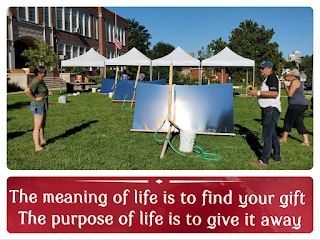#Count #️⃣🧛♂️ how many _stories_ you believe. How many are true?
Yet, you have no real data to verify most of those stories. Nor any easily available means to gather such data if you don't have it handy, to verify its accuracy and validity, and to ensure that the stories as told are backed up by data showing them as valid.
Some are obvious. Santa Claus, anyone?
Others are not so obvious.
Crime is up. Or down.
Is it, really, or did we just issue and count more, or less, police reports? What then is up? Or down? Crime, or police reporting?
Did police seek more crime because doing so will mean a raise? Or did they seek less as they were more comfortable eating donuts and less inclined to work the streets as hard?
Were crimes reported harder to find and report or (much) less hard to find and report than crimes that were actually not found and reported? Which crime is then up? Or down? The harsher crimes? Or the lesser crimes?
(Former NYC Mayor Rudy Giuliani was famous for being successful at reducing crime. Except the reduction started a few years before he took office and correlated with and was likely caused by something totally different than the election of Rudy—check with Freakonomics, by Lewitt and Dubner, as they tell the story and actual counter story extremely well.)
Then let's imagine _all_ the stories that we just believe, or held to be true and still do, all our life so far and we want to keep holding true ahead for the future. This is much more serious than it may seem at first sight to the untrained eye.
Take property rights. They're actually _reduced_, not protected, by HOAs. Of course they are reduced. What were you thinking? Ask Bob Yapp.👇
Brands are cool. Of course. Believe that. We've been conditioned that way almost forever. Offer them all free advertising at your own expense, even though you may not own stock in them (yet). This is a hard one to at least count, let alone reduce further unnecessary damage. It's even worse when counting for a teenager you may have at home. Uniforms in schools may solve the issue somewhat, but let's not count on it too much. It's controversial.
Hard work pays off. Of course it does. This is true. But it's not as self evident as it may seem at first sight. Story with college is incomplete, and by far imperfect, if student loans were the price you paid for that success. Depending of field and how long it took for a degree or more, repaying loans may take away your chance at joining early enough the ranks of believers in the American dream story of home ownership, for example.
What do you mean, _story_ of home ownership? Bank owns a home until mortgage is fully paid off. You knew that. Put this story on the list. Because we believe that a home is a wealth creation vehicle. _It depends_.
Got my personalized ticket. I'm off to Cartwheel Galaxy. See y'all.😎
Dedicated to the memory of Donald T Campbell and Paul Y Hammond. Thank you.
Follow in the footsteps of the great.
Look inside.
Repeat.
[3]

Adrian S. Petrescu, Ph.D., J.D.
Chief Future Architect, InnovationTrek
We got here. What's next?
Accelerate Innovation.
In companies and self.
Grow flow. Naturally.
ASPetrescu@InnovationTrek.org


No comments:
Post a Comment